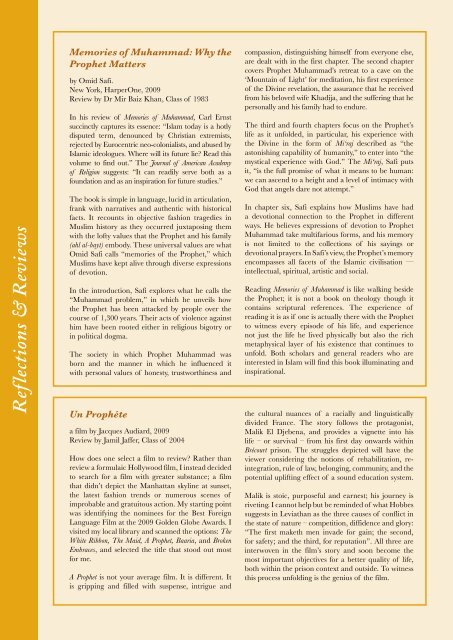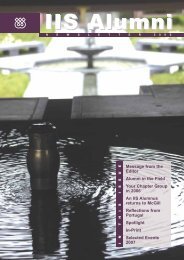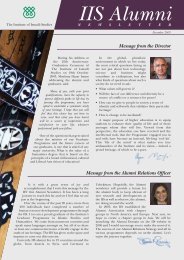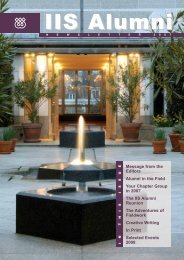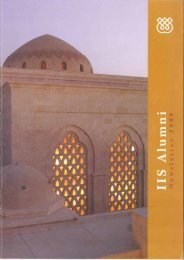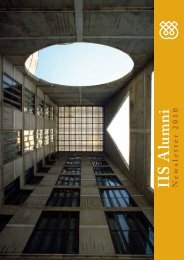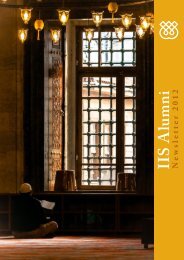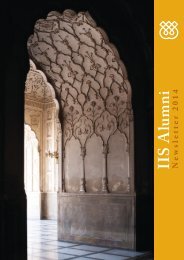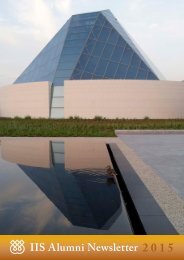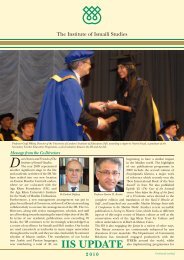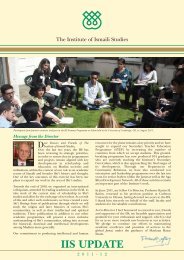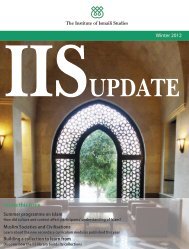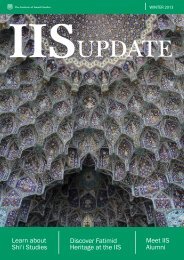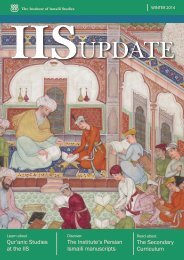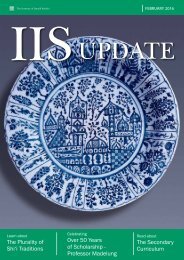IIS Alumni Newsletter 2011
Create successful ePaper yourself
Turn your PDF publications into a flip-book with our unique Google optimized e-Paper software.
Reflections & Reviews<br />
Memories of Muhammad: Why the<br />
Prophet Matters<br />
by Omid Safi.<br />
New York, HarperOne, 2009<br />
Review by Dr Mir Baiz Khan, Class of 1983<br />
In his review of Memories of Muhammad, Carl Ernst<br />
succinctly captures its essence: “Islam today is a hotly<br />
disputed term, denounced by Christian extremists,<br />
rejected by Eurocentric neo-colonialists, and abused by<br />
Islamic ideologues. Where will its future lie? Read this<br />
volume to find out.” The Journal of American Academy<br />
of Religion suggests: “It can readily serve both as a<br />
foundation and as an inspiration for future studies.”<br />
The book is simple in language, lucid in articulation,<br />
frank with narratives and authentic with historical<br />
facts. It recounts in objective fashion tragedies in<br />
Muslim history as they occurred juxtaposing them<br />
with the lofty values that the Prophet and his family<br />
(ahl al-bayt) embody. These universal values are what<br />
Omid Safi calls “memories of the Prophet,” which<br />
Muslims have kept alive through diverse expressions<br />
of devotion.<br />
In the introduction, Safi explores what he calls the<br />
“Muhammad problem,” in which he unveils how<br />
the Prophet has been attacked by people over the<br />
course of 1,300 years. Their acts of violence against<br />
him have been rooted either in religious bigotry or<br />
in political dogma.<br />
The society in which Prophet Muhammad was<br />
born and the manner in which he influenced it<br />
with personal values of honesty, trustworthiness and<br />
Un Prophéte<br />
a film by Jacques Audiard, 2009<br />
Review by Jamil Jaffer, Class of 2004<br />
How does one select a film to review? Rather than<br />
review a formulaic Hollywood film, I instead decided<br />
to search for a film with greater substance; a film<br />
that didn’t depict the Manhattan skyline at sunset,<br />
the latest fashion trends or numerous scenes of<br />
improbable and gratuitous action. My starting point<br />
was identifying the nominees for the Best Foreign<br />
Language Film at the 2009 Golden Globe Awards. I<br />
visited my local library and scanned the options: The<br />
White Ribbon, The Maid, A Prophet, Baaria, and Broken<br />
Embraces, and selected the title that stood out most<br />
for me.<br />
A Prophet is not your average film. It is different. It<br />
is gripping and filled with suspense, intrigue and<br />
compassion, distinguishing himself from everyone else,<br />
are dealt with in the first chapter. The second chapter<br />
covers Prophet Muhammad’s retreat to a cave on the<br />
‘Mountain of Light’ for meditation, his first experience<br />
of the Divine revelation, the assurance that he received<br />
from his beloved wife Khadija, and the suffering that he<br />
personally and his family had to endure.<br />
The third and fourth chapters focus on the Prophet’s<br />
life as it unfolded, in particular, his experience with<br />
the Divine in the form of Mi‘raj described as “the<br />
astonishing capability of humanity,” to enter into “the<br />
mystical experience with God.” The Mi‘raj, Safi puts<br />
it, “is the full promise of what it means to be human:<br />
we can ascend to a height and a level of intimacy with<br />
God that angels dare not attempt.”<br />
In chapter six, Safi explains how Muslims have had<br />
a devotional connection to the Prophet in different<br />
ways. He believes expressions of devotion to Prophet<br />
Muhammad take multifarious forms, and his memory<br />
is not limited to the collections of his sayings or<br />
devotional prayers. In Safi’s view, the Prophet’s memory<br />
encompasses all facets of the Islamic civilisation —<br />
intellectual, spiritual, artistic and social.<br />
Reading Memories of Muhammad is like walking beside<br />
the Prophet; it is not a book on theology though it<br />
contains scriptural references. The experience of<br />
reading it is as if one is actually there with the Prophet<br />
to witness every episode of his life, and experience<br />
not just the life he lived physically but also the rich<br />
metaphysical layer of his existence that continues to<br />
unfold. Both scholars and general readers who are<br />
interested in Islam will find this book illuminating and<br />
inspirational.<br />
the cultural nuances of a racially and linguistically<br />
divided France. The story follows the protagonist,<br />
Malik El Djebena, and provides a vignette into his<br />
life – or survival – from his first day onwards within<br />
Brécourt prison. The struggles depicted will have the<br />
viewer considering the notions of rehabilitation, reintegration,<br />
rule of law, belonging, community, and the<br />
potential uplifting effect of a sound education system.<br />
Malik is stoic, purposeful and earnest; his journey is<br />
riveting. I cannot help but be reminded of what Hobbes<br />
suggests in Leviathan as the three causes of conflict in<br />
the state of nature – competition, diffidence and glory:<br />
“The first maketh men invade for gain; the second,<br />
for safety; and the third, for reputation”. All three are<br />
interwoven in the film’s story and soon become the<br />
most important objectives for a better quality of life,<br />
both within the prison context and outside. To witness<br />
this process unfolding is the genius of the film.


